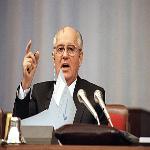This month marks the 20th anniversary of the collapse of the Soviet Union. It was the foreign policy of Mikhail Gorbachev, the last Soviet leader, that contributed to the demise of the Soviet Union.
Mikhail Gorbachev was elected Soviet leader on March 11, 1985. At 54, he was the youngest member of the ruling Politburo that voted him into power. For the next six years, he instituted policies that drastically altered the course of history and ultimately brought about the demise of the Soviet Union.
On the domestic front, those policies were known as glasnost (openness) and perestroika (restructuring). In foreign affairs, Gorbachev's reforms were known as "new thinking."
Experts say Gorbachev understood that the Soviet Union could no longer use its military force to increase its influence in the outside world. And in order to create a new foreign policy that could be sustained economically, Gorbachev realized that Moscow would have to - in some areas - retrench.
Archie Brown, Russia expert and Professor Emeritus at the University of Oxford, says one of those areas was Afghanistan, where Soviet troops had been fighting mujahedeen guerrilla forces since December 1979.
"Gorbachev in 1979, when the Soviet intervention took place, he met with [Eduard] Shevardnadze [the Georgian Communist Party leader] - at that time, they were both on the fringes of the top leadership and they were not involved in that decision," said Brown. "And they both agreed that it was a disastrous mistake. Now they didn't say so in Moscow at the time at meetings there, because if they had, that would put an immediate stop to their political careers."
Shortly after becoming Soviet leader, Mikhail Gorbachev named Shevardnadze foreign minister. And, says Archie Brown, Gorbachev wanted to get Soviet troops out of Afghanistan.
"He didn't want to do it in such a way to look like a defeat," added Brown. "He had the same problems that leaders of other countries have had, when many lives of their own young men have been lost, how do you explain to the mothers or fathers, for that matter, of these boys, that their deaths had been in vain? So he was trying to get a negotiated retreat. Nevertheless, he took a firm decision that all Soviet troops would be out by February 1989, and they were."
John Parker, Russia expert with the National Defense University, says Gorbachev also embarked on a radical policy regarding the Soviet military.
"He moved to cut the size of the Soviet army," Parker noted. "That was another thing that people just couldn't believe he would do. But before long, we saw the numbers start to come down."
Gorbachev's "new thinking" on foreign policy spread to Eastern Europe, where people were clamoring for an end to communist rule.
In July 1989, the Soviet policy to intervene to prop up communism ("the Brezhnev doctrine") was replaced by what one Gorbachev adviser described as the "Sinatra Doctrine," based on the singer's popular song, "My Way." In other words, the adviser said East European countries were now able to go their own way - politically and economically - without fear of invasion by Soviet troops.
Archie Brown and others say Gorbachev's non-interventionist policy ultimately led to the fall of the Berlin Wall on November 9, 1989.
"Because of the time difference, it happened while Gorbachev and other members of the Politburo were asleep in their beds in Moscow," recalled Brown. "By the next day, Gorbachev told the East German ambassador they had done the right thing in not trying to stop them and not using force - and he accepted remarkably readily, the fall of the wall and subsequent unification of Germany."
In October 1990, Mikhail Gorbachev was awarded the Nobel Peace Prize. Fourteen months later, he resigned as Soviet leader, experts say a victim of forces he unleashed, but ultimately could not control.
